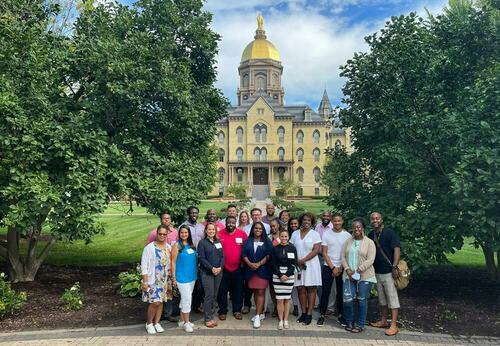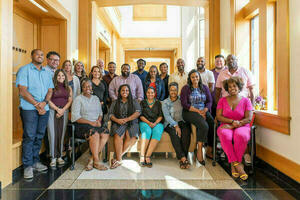
Leon Jackson (EMBA ’19) doesn’t need to look at the data on diversity in senior leadership roles to know that women and minorities make up a small percentage of those in corporate ranks. Sometimes, he can just look around the room.
One of a handful of minorities in his Executive MBA cohort of working professionals at the University of Notre Dame’s Mendoza College of Business, he remembers thinking, “This is an amazing space. Notre Dame is special; it just is. Why don’t we have more diversity?”
In August, he returned to Mendoza with 21 women and men from underrepresented groups for a three-day immersion in accounting and finance principles with finance teaching professor Walt Clements. The course is part of the new Diversity in Leadership (DIL) program at Marian University in Indianapolis, which Jackson launched during his time as executive director of strategic initiatives.

Jackson, who was appointed chancellor of Marian University’s Saint Joseph’s College in September, envisions DIL as a vehicle for transforming state into “a place where human flourishing is a realistic endeavor for all.”
The six-month program — a collaboration among Marian, Notre Dame and several other Indiana universities — is designed to help close gaps in educational attainment, wealth, skills and career opportunities for minoritized groups and to provide a path to executive leadership and entrepreneurship. Other partners include business schools at Butler University, Indiana University’s IUPUI campus and Purdue University.
Questions about how to move more people from underrepresented groups into leadership and executive ranks have been on Jackson’s mind since graduate school. Jackson, who has a doctorate in workforce development and organizational leadership from the University of Nevada-Las Vegas, believes higher education is one of the gatekeepers to those opportunities. “Typically, if you don’t have those credentials, you’re not going to be in those positions,” he says.
While a student at Notre Dame, he connected with Clements, who became one of several people at Notre Dame who served as both a sounding board and resource as Jackson began developing the program.
“This program looks to wrap the context of learning around real growth experiences, opportunities that are often not afforded minoritized groups, and remove barriers into degree programs that lead to the C-suite,” said Jackson. “DIL will transform passionate, talented and underutilized women and ethnic minorities into agents of impact, ready to help central Indiana realize its full potential as a major economic engine in the region, but it will take a concerted effort by all to facilitate access.”
Each partner institution hosts the program’s cohorts of up to 25 on their respective campuses once per month, led by faculty and staff from these institutions. Eligible participants must identify as a member of a minority group or a woman. Special consideration is given for women who have left the workplace for more than two years. All applicants must have earned a bachelor’s degree and have seven-plus years of work experience and at least two years of supervisory experience. The program had 48 applications for the first cohort and, by mid-September, already had more than 300 applicants for the spring 2022 cohort.
“Advancing diversity, equity and inclusion is critical to our mission and educational experience at Mendoza, as well as to the organizations our students will one day join,” said Martijn Cremers, the Martin J. Gillen Dean of the Mendoza College of Business. “We’re pleased to partner with the Diversity in Leadership Initiative as a way to serve a very diverse group of people and help to prepare them for their next step in either their careers or their business education.”
“If we are going to see the most complex business problems solved, we need diverse and ethical leadership at the highest levels — C-suite, boardroom, governance, regulatory and policy,” said María Stutsman y Márquez, director of Graduate Recruiting & Admissions at Mendoza. “Given the statistics of 8 percent of the Fortune 500 C-suite leadership roles are women and only 16 percent of the Fortune 100 C-suite is racially diverse, it’s clear that boards, executive teams and organizations are responsible for fostering such change.”

Participants are tasked with developing an understanding of key concepts, tools and frameworks learned through five courses including business analytics, leadership communication, accounting/finance, organizational strategy and leading change. They work with an executive coach for the duration of the program and apply what they’ve learned by completing a capstone project in their workplace.
“In that way, employers get a real ROI, a real return,” Jackson said. “And the individual now has an anchor experience which they can leverage to move up in the organization.”
Program graduates receive an executive mindset certification endorsed by all participating universities. They are also eligible to bypass the GMAT and GRE requirement for admission to graduate programs and are eligible for a streamlined admissions process into the business-related master program of their choice, along with a discount on tuition from any of the participating universities. Graduates also can leverage this experience to gain admission into Marian University’s doctorate in organizational leadership, should they meet the program’s entry requirements.
“At every stage of life, education is a catalyst,” said Stutsman y Márquez. “We know there are incredible disparities throughout our education system that impact access and opportunity based on factors such as race, ability, and socioeconomics. It is through partnerships such as these that create pathways to further education for those who aim to expand their capacity and impact within their industries, organizations, communities, families and beyond.”